Cosmetic Dentistry
Invisalign® – The Clear Alternative to Traditional Braces
Your Main Line Dentist is your Devon, Pennsylvania dental office for Invisalign clear braces. Invisalign® provides the state-of-the-art orthodontic system, straightening teeth using a series of durable, yet soft, nearly invisible, clear plastic aligners. To create that straight and attractive smile you’ve always wanted, Invisalign® aligners gradually adjust the position and alignment of teeth.
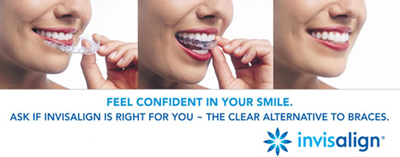
Invisalign eliminates the irritation and discomfort that can come with the brackets and wires involved in traditional orthodontic treatment. Invisalign’s clear aligners are virtually undetectable, making them easy to wear by adults without feeling self-conscious, which is why many Healthy Smiles patients discover that orthodontic treatment with Invisalign clear braces are a far more comfortable alternative to months/years of enduring traditional metal braces. They can also be worn by teens.
Dental Implants
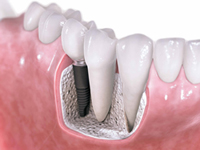 If you’re missing one or more teeth, or maybe have a bridge or denture that’s inconvenient or troublesome, dental implants might be the ideal solution for you. These porcelain reconstructions are placed on a permanent post anchored into your jaw. They look and work just like real teeth! No one will be able to tell the difference, and they look like they’re coming up through the gum, just like all your other teeth.
If you’re missing one or more teeth, or maybe have a bridge or denture that’s inconvenient or troublesome, dental implants might be the ideal solution for you. These porcelain reconstructions are placed on a permanent post anchored into your jaw. They look and work just like real teeth! No one will be able to tell the difference, and they look like they’re coming up through the gum, just like all your other teeth.
Implants can also be used to anchor a bridge or denture, to make you more comfortable and keep them from sliding around and getting in the way. So if you’ve lost teeth because of trauma, illness, congenital defects, or decay, this solution might be right for you.
If you’re looking for a stable, secure solution that preserves your facial structure and prevents bone loss, come in for a consultation today.
Dentures
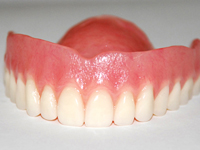 Dentures are replacements for missing teeth that can be removed and replaced as you please. Depending on each individual patient, they may require full or partial dentures. Full removable dentures are used when all of the natural teeth are removed from the mouth. There are two types of full dentures.
Dentures are replacements for missing teeth that can be removed and replaced as you please. Depending on each individual patient, they may require full or partial dentures. Full removable dentures are used when all of the natural teeth are removed from the mouth. There are two types of full dentures.
Conventional Full Dentures - This is when all the teeth are removed and the tissue is given time to heal before the dentures are placed. It could take a few months for the gum tissue to heal completely, and during this time you will be without teeth.
Immediate Full Dentures – Prior to having your teeth removed, Dr. Sharma will take impressions and have dentures custom fitted for your mouth. After removing the teeth, the dentures are immediately placed in your mouth. The benefit is that you do not have to spend any time without teeth. You will, however, need to have a follow up visit to reline your dentures because the tissues will change shape as your mouth heals.
Partial dentures are another option when not all of your teeth need to be removed. This is similar to a bridge, but it is not a permanent fixture in your mouth.
Implant Overdentures
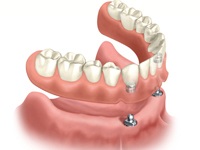 An implant overdenture fits over your own remaining natural teeth roots or dental implants that have been installed by your oral surgeon or other dental specialist. The retained root or implant provides you with excellent stability and support for your denture implants.
An implant overdenture fits over your own remaining natural teeth roots or dental implants that have been installed by your oral surgeon or other dental specialist. The retained root or implant provides you with excellent stability and support for your denture implants.
Unlike traditional dentures, root-supported or implant-supported overdentures or implant dentures are held in place by dental attachments which provide the retentive strength that you desire. An attachment retained implant overdenture will provide maximum retention, increase in function, and added health benefits. Implant overdenture attachments are composed of two working components; the root post which is cemented into your root or an implant abutment that is threaded into your implant, and the denture cap which is retained in the underside of your denture.
The most important consideration in your decision to choose an implant overdenture or denture implant is the limited retention and stability of a traditional denture, which relies on suction alone. Over time, retention only worsens due to continual bone loss (atrophy) of your dental arches from the lack of teeth. When a tooth loses bone support through the years, its root can be saved and used to anchor an implant overdenture. The significant concerns regarding function, retention, stability, mastication (chewing), and speaking can be overcome by maintaining the level of bone present in the upper jaw (maxilla) and lower jaw (mandible). These issues can be successfully accomplished by keeping your own roots, or if you are edentulous (without teeth) having dental implants placed by your oral surgeon may be an option.
Full Mouth Rehabilitation
 Only after your consultation with Dr. Taniya Sharma, can she determine what procedures are needed for your specific case for full mouth restoration. There may be other treatments available, so ask Dr. Sharma about all possible procedures that might be required for your case and under what circumstances.
Only after your consultation with Dr. Taniya Sharma, can she determine what procedures are needed for your specific case for full mouth restoration. There may be other treatments available, so ask Dr. Sharma about all possible procedures that might be required for your case and under what circumstances.
Most full mouth reconstructions involve multiple phases and office visits. It is not unreasonable to expect treatment to take 12 months or more, depending on your situation. The following procedures may be involved, depending on your needs:
- Prophylactic teeth cleaning and periodontal.
- Crown lengthening to expose healthy, sound tooth structure for possible crowns or bridges.
- Orthognathic surgery to reposition the jaw.
- Contouring of the gum tissue to create balance and harmony in your smile.
- Preparation (reduction) of your natural tooth structure so crowns, bridges or veneers can be placed.
- Placement of temporary restorations so you can become accustomed to your new teeth and the feel of your new mouth or bite alignment.
- Placement of permanent restorations, such as crowns, veneers, inlays/onlays or bridges, made from ceramic, ceramic supported by metal or a combination of both.
- Orthodontics (braces) in order to move your teeth into the optimal position for reconstruction.
- Implant placement and restoration to replace missing teeth and/or anchor bridge restorations.
- Bone or soft tissue grafting to enhance the stability of your teeth, proposed implants and/or other restorations.
KöR Whitening Deep Bleaching
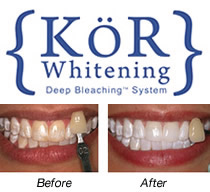 KöR Whitening Deep Bleaching is the newest, most revolutionary and effective teeth whitening system ever developed. Unlike typical teeth whitening procedures:
KöR Whitening Deep Bleaching is the newest, most revolutionary and effective teeth whitening system ever developed. Unlike typical teeth whitening procedures:
KöR Whitening is so effective; it is the only recognized system in the world that will even whiten tetracycline (dark) stained teeth, previously thought to be impossible.
With easy periodic at-home maintenance your teeth will stay white permanently, even while you continue to drink red wine, tea, coffee etc.
During the whitening process nearly all patients experience only low to typically no teeth sensitivity.
This procedure is comfortable and 100% safe for your teeth and gums. The result is a radiantly white, natural appearing smile that you will LOVE! It’s perfect for everyone, from 14 to 90!
If you’ve ever thought about whitening your smile, now is the time to give us a call. The consultation is free!
Zoom! In-Office Whitening
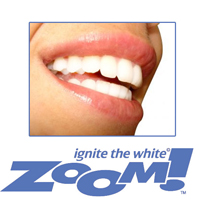 With Zoom!, you will have bright, white, dazzling teeth in about an hour. This single-visit, in-office whitening procedure will get your teeth their whitest in the shortest amount of time possible. Imagine walking into our office with dull, dingy appearing teeth and leaving about an hour later with a beautiful, confident smile. Not only does Zoom! give immediate results, the process is safe and comfortable.
With Zoom!, you will have bright, white, dazzling teeth in about an hour. This single-visit, in-office whitening procedure will get your teeth their whitest in the shortest amount of time possible. Imagine walking into our office with dull, dingy appearing teeth and leaving about an hour later with a beautiful, confident smile. Not only does Zoom! give immediate results, the process is safe and comfortable.
Take-Home Whitening
Many patients prefer to use an at-home whitening method to brighten their teeth. This affordable, flexible alternative typically includes custom-fit trays, whitening gel available at different levels of concentration in amounts dependent upon each patient's needs, and precise instructions on how to achieve the level of whiteness you're aiming for.
Porcelain Veneers
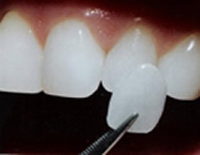 Traditional porcelain veneers, alternatively termed "dental veneers" or "dental porcelain laminates," are wafer-thin shells of porcelain permanently bonded to teeth that are discolored, worn, chipped, or misaligned. Porcelain veneers are non-porous (they will not stain), incredibly resilient, and "kind" (non-abrasive) to opposing teeth. When it is firmly bonded to a sturdy substructure (like a tooth) it becomes very strong and durable.
Traditional porcelain veneers, alternatively termed "dental veneers" or "dental porcelain laminates," are wafer-thin shells of porcelain permanently bonded to teeth that are discolored, worn, chipped, or misaligned. Porcelain veneers are non-porous (they will not stain), incredibly resilient, and "kind" (non-abrasive) to opposing teeth. When it is firmly bonded to a sturdy substructure (like a tooth) it becomes very strong and durable.
A traditional veneer is essentially a conservative crown. Rather than encompassing the entire tooth a cosmetic veneer covers the visible part of a tooth, preserving a large amount of the natural tooth structure. They can straighten, lengthen, and whiten teeth to provide a beautiful smile and even create a more comfortable bite position. For optimal results, each veneered tooth must be shaped. This means that a thin layer (approximately .5 mm) of the natural tooth structure is removed to allow space for placement.


